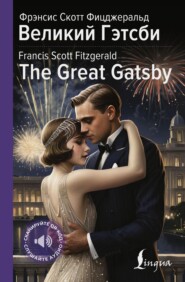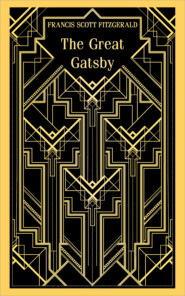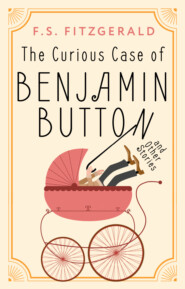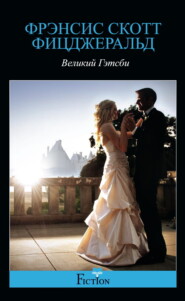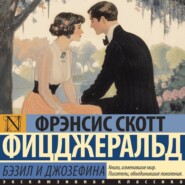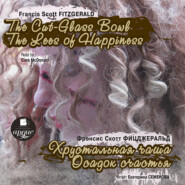По всем вопросам обращайтесь на: info@litportal.ru
(©) 2003-2025.
✖
«Великий Гэтсби» и другие лучшие произведения Ф.С. Фицджеральда
Год написания книги
2015
Теги
Настройки чтения
Размер шрифта
Высота строк
Поля
He nodded.
‘At first I din’ notice we’d stopped.’
A pause. Then, taking a long breath and straightening his shoulders, he remarked in a determined voice:
‘Wonder’ff tell me where there’s a gas’line station?’
At least a dozen men, some of them a little better off than he was, explained to him that wheel and car were no longer joined by any physical bond.
‘Back out,’ he suggested after a moment. ‘Put her in reverse.’
‘But the wheel’s off!’
He hesitated.
‘No harm in trying,’ he said.
The caterwauling horns had reached a crescendo and I turned away and cut across the lawn toward home. I glanced back once. A wafer of a moon was shining over Gatsby’s house, making the night fine as before, and surviving the laughter and the sound of his still glowing garden. A sudden emptiness seemed to flow now from the windows and the great doors, endowing with complete isolation the figure of the host, who stood on the porch, his hand up in a formal gesture of farewell.
* * *
Reading over what I have written so far, I see I have given the impression that the events of three nights several weeks apart were all that absorbed me. On the contrary, they were merely casual events in a crowded summer, and, until much later, they absorbed me infinitely less than my personal affairs.
Most of the time I worked. In the early morning the sun threw my shadow westward as I hurried down the white chasms of lower New York to the Probity Trust. I knew the other clerks and young bond-salesmen by their first names, and lunched with them in dark, crowded restaurants on little pig sausages and mashed potatoes and coffee. I even had a short affair with a girl who lived in Jersey City[50 - Jersey City – a city in northeastern New Jersey, located on a peninsula between the Hudson and the Hackensack rivers opposite Manhattan Island] and worked in the accounting department, but her brother began throwing mean looks in my direction, so when she went on her vacation in July I let it blow quietly away.
I took dinner usually at the Yale Club – for some reason it was the gloomiest event of my day – and then I went upstairs to the library and studied investments and securities for a conscientious hour. There were generally a few rioters around, but they never came into the library, so it was a good place to work. After that, if the night was mellow, I strolled down Madison Avenue past the old Murray Hill Hotel, and over 33rd Street to the Pennsylvania Station.
I began to like New York, the racy, adventurous feel of it at night, and the satisfaction that the constant flicker of men and women and machines gives to the restless eye. I liked to walk up Fifth Avenue and pick out romantic women from the crowd and imagine that in a few minutes I was going to enter into their lives, and no one would ever know or disapprove. Sometimes, in my mind, I followed them to their apartments on the corners of hidden streets, and they turned and smiled back at me before they faded through a door into warm darkness. At the enchanted metropolitan twilight I felt a haunting loneliness sometimes, and felt it in others – poor young clerks who loitered in front of windows waiting until it was time for a solitary restaurant dinner – young clerks in the dusk, wasting the most poignant moments of night and life.
Again at eight o’clock, when the dark lanes of the Forties were lined five deep with throbbing taxicabs, bound for the theatre district, I felt a sinking in my heart. Forms leaned together in the taxis as they waited, and voices sang, and there was laughter from unheard jokes, and lighted cigarettes made unintelligible circles inside. Imagining that I, too, was hurrying toward gaiety and sharing their intimate excitement, I wished them well.
For a while I lost sight of Jordan Baker, and then in midsummer I found her again. At first I was flattered to go places with her, because she was a golf champion, and everyone knew her name. Then it was something more. I wasn’t actually in love, but I felt a sort of tender curiosity. The bored haughty face that she turned to the world concealed something – most affectations conceal something eventually, even though they don’t in the beginning – and one day I found what it was. When we were on a house-party together up in Warwick, she left a borrowed car out in the ram with the top down, and then lied about it – and suddenly I remembered the story about her that had eluded me that night at Daisy’s. At her first big golf tournament there was a row that nearly reached the newspapers – a suggestion that she had moved her ball from a bad lie in the semi-final round. The thing approached the proportions of a scandal – then died away. A caddy retracted his statement, and the only other witness admitted that he might have been mistaken. The incident and the name had remained together in my mind.
Jordan Baker instinctively avoided clever, shrewd men and now I saw that this was because she felt safer on a plane where any divergence from a code would be thought impossible. She was incurably dishonest. She wasn’t able to endure being at a disadvantage and given this unwillingness, I suppose she had begun dealing in subterfuges when she was very young in order to keep that cool, insolent smile turned to the world and yet satisfy the demands of her hard, jaunty body.
It made no difference to me. Dishonesty in a woman is a thing you never blame deeply – I was casually sorry, and then I forgot. It was on that same house party that we had a curious conversation about driving a car. It started because she passed so close to some workmen that our fender flicked a button on one man’s coat.
‘You’re a rotten driver,’ I protested. ‘Either you ought to be more careful, or you oughtn’t to drive at all.’
‘I am careful.’
‘No, you’re not.’
‘Well, other people are,’ she said lightly.
‘What’s that got to do with it?’
‘They’ll keep out of my way,’ she insisted. ‘It takes two to make an accident.’
‘Suppose you met somebody just as careless as yourself.’
‘I hope I never will,’ she answered. ‘I hate careless people. That’s why I like you.’
Her grey, sun-strained eyes stared straight ahead, but she had deliberately shifted our relations, and for a moment I thought I loved her. But I am slow-thinking and full of interior rules that act as brakes on my desires, and I knew that first I had to get myself definitely out of that tangle back home. I’d been writing letters once a week and signing them: ‘Love, Nick,’ and all I could think of was how, when that certain girl played tennis, a faint moustache of perspiration appeared on her upper lip. Nevertheless there was a vague understanding that had to be tactfully broken off before I was free.
Every one suspects himself of at least one of the cardinal virtues, and this is mine: I am one of the few honest people that I have ever known.
Chapter IV
On Sunday morning while church bells rang in the villages alongshore, the world and its mistress returned to Gatsby’s house and twinkled hilariously on his lawn.
‘He’s a bootlegger,’ said the young ladies, moving somewhere between his cocktails and his flowers. ‘One time he killed a man who had found out that he was nephew to Von Hindenburg[51 - Von Hindenburg – Paul von Hindenburg (1847–1934), German field marshal during World War I and then, in 1925–1934, the second president of Germany (of the so called Weimar Republic)] and second cousin to the devil. Reach me a rose, honey, and pour me a last drop into that there crystal glass.’
Once I wrote down on the empty spaces of a time-table the names of those who came to Gatsby’s house that summer. It is an old time-table now, disintegrating at its folds, and headed ‘This schedule in effect July 5
, 1922.’ But I can still read the grey names, and they will give you a better impression than my generalities of those who accepted Gatsby’s hospitality and paid him the subtle tribute of knowing nothing whatever about him.
From East Egg, then, came the Chester Beckers and the Leeches, and a man named Bunsen, whom I knew at Yale, and Doctor Webster Civet, who was drowned last summer up in Maine[52 - Maine – the US state in the northeast, one of the original New England states]. And the Hornbeams and the Willie Voltaires, and a whole clan named Blackbuck, who always gathered in a corner and flipped up their noses like goats at whosoever came near. And the Ismays and the Chrysties (or rather Hubert Auerbach and Mr. Chrystie’s wife), and Edgar Beaver, whose hair, they say, turned cotton-white one winter afternoon for no good reason at all.
Clarence Endive was from East Egg, as I remember. He came only once, in white knickerbockers, and had a fight with a bum named Etty in the garden. From farther out on the Island came the Cheadles and the O. R. P. Schraeders, and the Stonewall Jackson Abrams of Georgia, and the Fishguards and the Ripley Snells. Snell was there three days before he went to the penitentiary, so drunk out on the gravel drive that Mrs. Ulysses Swett’s automobile ran over his right hand. The Dancies came, too, and S. B. Whitebait, who was well over sixty, and Maurice A. Flink, and the Hammerheads, and Beluga the tobacco importer, and Beluga’s girls.
From West Egg came the Poles and the Mulreadys and Cecil Roebuck and Cecil Schoen and Gulick the State senator and Newton Orchid, who controlled Films Par Excellence, and Eckhaust and Clyde Cohen and Don S. Schwartze (the son) and Arthur McCarty, all connected with the movies in one way or another. And the Catlips and the Bembergs and G. Earl Muldoon, brother to that Muldoon who afterward strangled his wife. Da Fontano the promoter came there, and Ed Legros and James B. (‘Rot-Gut’) Ferret and the De Jongs and Ernest Lilly – they came to gamble, and when Ferret wandered into the garden it meant he was cleaned out and Associated Traction would have to fluctuate profitably next day.
A man named Klipspringer was there so often and so long that he became known as ‘the boarder’ – I doubt if he had any other home. Of theatrical people there were Gus Waize and Horace O’Dona-van and Lestel Myer and George Duckweed and Francis Bull. Also from New York were the Chromes and the Backhyssons and the Dennickers and Russel Betty and the Corrigans and the Kellehers and the Dewars and the Scullys and S. W. Belcher and the Smirkes and the young Quinns, divorced now, and Henry L. Palmetto, who killed himself by jumping in front of a subway train in Times Square.
Benny McClenahan arrived always with four girls. They were never quite the same ones in physical person, but they were so identical one with another that it inevitably seemed they had been there before. I have forgotten their names – Jaqueline, I think, or else Consuela, or Gloria or Judy or June, and their last names were either the melodious names of flowers and months or the sterner ones of the great American capitalists whose cousins, if pressed, they would confess themselves to be.
In addition to all these I can remember that Faustina O’Brien came there at least once and the Baedeker girls and young Brewer, who had his nose shot off in the war, and Mr. Albrucksburger and Miss Haag, his fiancée, and Ardita Fitz-Peters and Mr. P. Jewett, once head of the American Legion[53 - American Legion – organization of United States war veterans, founded in 1919], and Miss Claudia Hip, with a man reputed to be her chauffeur, and a prince of something, whom we called Duke, and whose name, if I ever knew it, I have forgotten.
All these people came to Gatsby’s house in the summer.
* * *
At nine o’clock, one morning late in July, Gatsby’s gorgeous car lurched up the rocky drive to my door and gave out a burst of melody from its three-noted horn. It was the first time he had called on me, though I had gone to two of his parties, mounted in his hydroplane, and, at his urgent invitation, made frequent use of his beach.
‘Good morning, old sport. You’re having lunch with me today and I thought we’d ride up together.’
He was balancing himself on the dashboard of his car with that resourcefulness of movement that is so peculiarly American – that comes, I suppose, with the absence of lifting work in youth and, even more, with the formless grace of our nervous, sporadic games. This quality was continually breaking through his punctilious manner in the shape of restlessness. He was never quite still, there was always a tapping foot somewhere or the impatient opening and closing of a hand.
He saw me looking with admiration at his car.
‘It’s pretty, isn’t it, old sport?’ He jumped off to give me a better view. ‘Haven’t you ever seen it before?’
I’d seen it. Everybody had seen it. It was a rich cream colour, bright with nickel, swollen here and there in its monstrous length with triumphant hat-boxes and supper-boxes and tool-boxes, and terraced with a labyrinth of wind-shields that mirrored a dozen suns. Sitting down behind many layers of glass in a sort of green leather conservatory, we started to town.
I had talked with him perhaps half a dozen times in the past month and found, to my disappointment, that he had little to say. So my first impression, that he was a person of some undefined consequence, had gradually faded and he had become simply the proprietor of an elaborate road-house next door.
And then came that disconcerting ride. We hadn’t reached West Egg Village before Gatsby began leaving his elegant sentences unfinished and slapping himself indecisively on the knee of his caramel-coloured suit.
‘At first I din’ notice we’d stopped.’
A pause. Then, taking a long breath and straightening his shoulders, he remarked in a determined voice:
‘Wonder’ff tell me where there’s a gas’line station?’
At least a dozen men, some of them a little better off than he was, explained to him that wheel and car were no longer joined by any physical bond.
‘Back out,’ he suggested after a moment. ‘Put her in reverse.’
‘But the wheel’s off!’
He hesitated.
‘No harm in trying,’ he said.
The caterwauling horns had reached a crescendo and I turned away and cut across the lawn toward home. I glanced back once. A wafer of a moon was shining over Gatsby’s house, making the night fine as before, and surviving the laughter and the sound of his still glowing garden. A sudden emptiness seemed to flow now from the windows and the great doors, endowing with complete isolation the figure of the host, who stood on the porch, his hand up in a formal gesture of farewell.
* * *
Reading over what I have written so far, I see I have given the impression that the events of three nights several weeks apart were all that absorbed me. On the contrary, they were merely casual events in a crowded summer, and, until much later, they absorbed me infinitely less than my personal affairs.
Most of the time I worked. In the early morning the sun threw my shadow westward as I hurried down the white chasms of lower New York to the Probity Trust. I knew the other clerks and young bond-salesmen by their first names, and lunched with them in dark, crowded restaurants on little pig sausages and mashed potatoes and coffee. I even had a short affair with a girl who lived in Jersey City[50 - Jersey City – a city in northeastern New Jersey, located on a peninsula between the Hudson and the Hackensack rivers opposite Manhattan Island] and worked in the accounting department, but her brother began throwing mean looks in my direction, so when she went on her vacation in July I let it blow quietly away.
I took dinner usually at the Yale Club – for some reason it was the gloomiest event of my day – and then I went upstairs to the library and studied investments and securities for a conscientious hour. There were generally a few rioters around, but they never came into the library, so it was a good place to work. After that, if the night was mellow, I strolled down Madison Avenue past the old Murray Hill Hotel, and over 33rd Street to the Pennsylvania Station.
I began to like New York, the racy, adventurous feel of it at night, and the satisfaction that the constant flicker of men and women and machines gives to the restless eye. I liked to walk up Fifth Avenue and pick out romantic women from the crowd and imagine that in a few minutes I was going to enter into their lives, and no one would ever know or disapprove. Sometimes, in my mind, I followed them to their apartments on the corners of hidden streets, and they turned and smiled back at me before they faded through a door into warm darkness. At the enchanted metropolitan twilight I felt a haunting loneliness sometimes, and felt it in others – poor young clerks who loitered in front of windows waiting until it was time for a solitary restaurant dinner – young clerks in the dusk, wasting the most poignant moments of night and life.
Again at eight o’clock, when the dark lanes of the Forties were lined five deep with throbbing taxicabs, bound for the theatre district, I felt a sinking in my heart. Forms leaned together in the taxis as they waited, and voices sang, and there was laughter from unheard jokes, and lighted cigarettes made unintelligible circles inside. Imagining that I, too, was hurrying toward gaiety and sharing their intimate excitement, I wished them well.
For a while I lost sight of Jordan Baker, and then in midsummer I found her again. At first I was flattered to go places with her, because she was a golf champion, and everyone knew her name. Then it was something more. I wasn’t actually in love, but I felt a sort of tender curiosity. The bored haughty face that she turned to the world concealed something – most affectations conceal something eventually, even though they don’t in the beginning – and one day I found what it was. When we were on a house-party together up in Warwick, she left a borrowed car out in the ram with the top down, and then lied about it – and suddenly I remembered the story about her that had eluded me that night at Daisy’s. At her first big golf tournament there was a row that nearly reached the newspapers – a suggestion that she had moved her ball from a bad lie in the semi-final round. The thing approached the proportions of a scandal – then died away. A caddy retracted his statement, and the only other witness admitted that he might have been mistaken. The incident and the name had remained together in my mind.
Jordan Baker instinctively avoided clever, shrewd men and now I saw that this was because she felt safer on a plane where any divergence from a code would be thought impossible. She was incurably dishonest. She wasn’t able to endure being at a disadvantage and given this unwillingness, I suppose she had begun dealing in subterfuges when she was very young in order to keep that cool, insolent smile turned to the world and yet satisfy the demands of her hard, jaunty body.
It made no difference to me. Dishonesty in a woman is a thing you never blame deeply – I was casually sorry, and then I forgot. It was on that same house party that we had a curious conversation about driving a car. It started because she passed so close to some workmen that our fender flicked a button on one man’s coat.
‘You’re a rotten driver,’ I protested. ‘Either you ought to be more careful, or you oughtn’t to drive at all.’
‘I am careful.’
‘No, you’re not.’
‘Well, other people are,’ she said lightly.
‘What’s that got to do with it?’
‘They’ll keep out of my way,’ she insisted. ‘It takes two to make an accident.’
‘Suppose you met somebody just as careless as yourself.’
‘I hope I never will,’ she answered. ‘I hate careless people. That’s why I like you.’
Her grey, sun-strained eyes stared straight ahead, but she had deliberately shifted our relations, and for a moment I thought I loved her. But I am slow-thinking and full of interior rules that act as brakes on my desires, and I knew that first I had to get myself definitely out of that tangle back home. I’d been writing letters once a week and signing them: ‘Love, Nick,’ and all I could think of was how, when that certain girl played tennis, a faint moustache of perspiration appeared on her upper lip. Nevertheless there was a vague understanding that had to be tactfully broken off before I was free.
Every one suspects himself of at least one of the cardinal virtues, and this is mine: I am one of the few honest people that I have ever known.
Chapter IV
On Sunday morning while church bells rang in the villages alongshore, the world and its mistress returned to Gatsby’s house and twinkled hilariously on his lawn.
‘He’s a bootlegger,’ said the young ladies, moving somewhere between his cocktails and his flowers. ‘One time he killed a man who had found out that he was nephew to Von Hindenburg[51 - Von Hindenburg – Paul von Hindenburg (1847–1934), German field marshal during World War I and then, in 1925–1934, the second president of Germany (of the so called Weimar Republic)] and second cousin to the devil. Reach me a rose, honey, and pour me a last drop into that there crystal glass.’
Once I wrote down on the empty spaces of a time-table the names of those who came to Gatsby’s house that summer. It is an old time-table now, disintegrating at its folds, and headed ‘This schedule in effect July 5
, 1922.’ But I can still read the grey names, and they will give you a better impression than my generalities of those who accepted Gatsby’s hospitality and paid him the subtle tribute of knowing nothing whatever about him.
From East Egg, then, came the Chester Beckers and the Leeches, and a man named Bunsen, whom I knew at Yale, and Doctor Webster Civet, who was drowned last summer up in Maine[52 - Maine – the US state in the northeast, one of the original New England states]. And the Hornbeams and the Willie Voltaires, and a whole clan named Blackbuck, who always gathered in a corner and flipped up their noses like goats at whosoever came near. And the Ismays and the Chrysties (or rather Hubert Auerbach and Mr. Chrystie’s wife), and Edgar Beaver, whose hair, they say, turned cotton-white one winter afternoon for no good reason at all.
Clarence Endive was from East Egg, as I remember. He came only once, in white knickerbockers, and had a fight with a bum named Etty in the garden. From farther out on the Island came the Cheadles and the O. R. P. Schraeders, and the Stonewall Jackson Abrams of Georgia, and the Fishguards and the Ripley Snells. Snell was there three days before he went to the penitentiary, so drunk out on the gravel drive that Mrs. Ulysses Swett’s automobile ran over his right hand. The Dancies came, too, and S. B. Whitebait, who was well over sixty, and Maurice A. Flink, and the Hammerheads, and Beluga the tobacco importer, and Beluga’s girls.
From West Egg came the Poles and the Mulreadys and Cecil Roebuck and Cecil Schoen and Gulick the State senator and Newton Orchid, who controlled Films Par Excellence, and Eckhaust and Clyde Cohen and Don S. Schwartze (the son) and Arthur McCarty, all connected with the movies in one way or another. And the Catlips and the Bembergs and G. Earl Muldoon, brother to that Muldoon who afterward strangled his wife. Da Fontano the promoter came there, and Ed Legros and James B. (‘Rot-Gut’) Ferret and the De Jongs and Ernest Lilly – they came to gamble, and when Ferret wandered into the garden it meant he was cleaned out and Associated Traction would have to fluctuate profitably next day.
A man named Klipspringer was there so often and so long that he became known as ‘the boarder’ – I doubt if he had any other home. Of theatrical people there were Gus Waize and Horace O’Dona-van and Lestel Myer and George Duckweed and Francis Bull. Also from New York were the Chromes and the Backhyssons and the Dennickers and Russel Betty and the Corrigans and the Kellehers and the Dewars and the Scullys and S. W. Belcher and the Smirkes and the young Quinns, divorced now, and Henry L. Palmetto, who killed himself by jumping in front of a subway train in Times Square.
Benny McClenahan arrived always with four girls. They were never quite the same ones in physical person, but they were so identical one with another that it inevitably seemed they had been there before. I have forgotten their names – Jaqueline, I think, or else Consuela, or Gloria or Judy or June, and their last names were either the melodious names of flowers and months or the sterner ones of the great American capitalists whose cousins, if pressed, they would confess themselves to be.
In addition to all these I can remember that Faustina O’Brien came there at least once and the Baedeker girls and young Brewer, who had his nose shot off in the war, and Mr. Albrucksburger and Miss Haag, his fiancée, and Ardita Fitz-Peters and Mr. P. Jewett, once head of the American Legion[53 - American Legion – organization of United States war veterans, founded in 1919], and Miss Claudia Hip, with a man reputed to be her chauffeur, and a prince of something, whom we called Duke, and whose name, if I ever knew it, I have forgotten.
All these people came to Gatsby’s house in the summer.
* * *
At nine o’clock, one morning late in July, Gatsby’s gorgeous car lurched up the rocky drive to my door and gave out a burst of melody from its three-noted horn. It was the first time he had called on me, though I had gone to two of his parties, mounted in his hydroplane, and, at his urgent invitation, made frequent use of his beach.
‘Good morning, old sport. You’re having lunch with me today and I thought we’d ride up together.’
He was balancing himself on the dashboard of his car with that resourcefulness of movement that is so peculiarly American – that comes, I suppose, with the absence of lifting work in youth and, even more, with the formless grace of our nervous, sporadic games. This quality was continually breaking through his punctilious manner in the shape of restlessness. He was never quite still, there was always a tapping foot somewhere or the impatient opening and closing of a hand.
He saw me looking with admiration at his car.
‘It’s pretty, isn’t it, old sport?’ He jumped off to give me a better view. ‘Haven’t you ever seen it before?’
I’d seen it. Everybody had seen it. It was a rich cream colour, bright with nickel, swollen here and there in its monstrous length with triumphant hat-boxes and supper-boxes and tool-boxes, and terraced with a labyrinth of wind-shields that mirrored a dozen suns. Sitting down behind many layers of glass in a sort of green leather conservatory, we started to town.
I had talked with him perhaps half a dozen times in the past month and found, to my disappointment, that he had little to say. So my first impression, that he was a person of some undefined consequence, had gradually faded and he had become simply the proprietor of an elaborate road-house next door.
And then came that disconcerting ride. We hadn’t reached West Egg Village before Gatsby began leaving his elegant sentences unfinished and slapping himself indecisively on the knee of his caramel-coloured suit.







